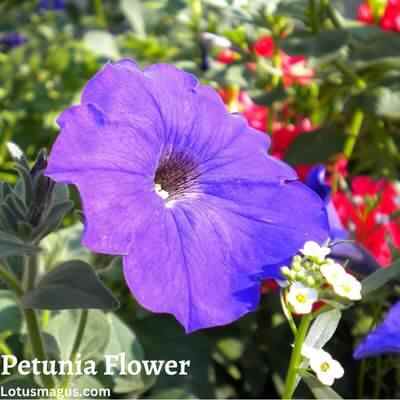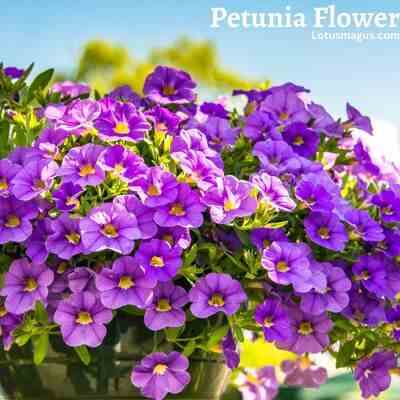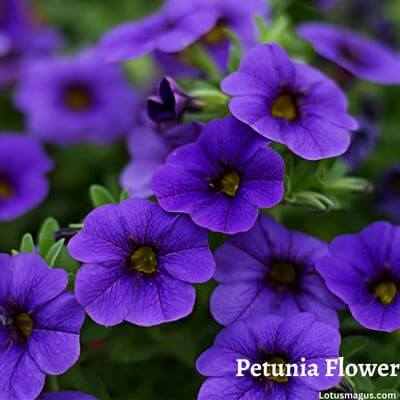Petunias are a popular garden flower known for their vibrant colors and lovely fragrance. But did you know that petunias also have deep meaning and symbolism that have been cherished for centuries? From love and romance to expressing gratitude, petunias have been used to convey a range of emotions and sentiments. In this blog post, we’ll delve into the world of petunia flower meaning and symbolism and uncover the fascinating stories and legends behind this beloved flower.
Petunia Flower Meaning : Petunia flower symbolizes longing, desire, hope, peace, optimism, faith, calmness and tranquility. The petunia flower is often associated with emotions such as resentment, anger, and spitefulness, especially in the Western culture. However, the meaning of petunias varies depending on their color. For instance, white petunias symbolize innocence, purity, and spirituality. The color purple is associated with fantasy, mystery, grace, and enchantment. Purple petunias symbolize charm, mystery, and fantasy, and the flower has whimsical connotations. It can also be associated with eloquence and grace.
Pink petunias represent femininity and gentleness. They are usually related to themes like motherly love and compassion. It is a perfect gift to almost anyone who needs an extra boost of encouragement, particularly for new mothers or someone who is recovering from a tough time.
Despite its elegant beauty, the petunia flower is often seen as a symbol of anger, disappointment, and resentment. However, according to some sources, petunias are also a symbol of not losing hope. They can convey the emotion of a feel-good factor, and they can be a source of comfort to someone who is going through a tough time.
The symbolic meaning of the petunia flower teaches you to associate yourself with people who bring out the best in you. These flowers teach you the art of patience, perseverance, and never losing hope. They are a reminder that even though life can be tough, you can always find beauty and goodness if you look for it.
| Specification | Description |
|---|---|
| Scientific Name | Petunia |
| Common Name | Petunia |
| Family | Solanaceae |
| Genus | Petunia |
| Native Range | South America |
| Bloom Time | Late spring to fall (year-round in warm climates) |
| Flower Colors | Wide range, including white, pink, purple, and red |
| Flower Shape | Trumpet-shaped with five fused petals |
| Fragrance | Mildly sweet and pleasant |
| Plant Height | 6-24 inches (15-60 cm) depending on variety |
| Plant Spread | 12-36 inches (30-90 cm) depending on variety |
| Sun Requirements | Full sun |
| Soil Requirements | Well-draining soil with medium moisture retention |
| Watering Needs | Moderate |
| Fertilizer Needs | Moderate to high |
| Propagation Method | Seed, cutting, or division |
| Uses | Garden beds and borders, hanging baskets, containers |
Want to get petunia flowers –
What is Petunia Flower?
Petunia is a South American nightshade genus containing roughly 35 blooming plants. The French borrowed “petun,” meaning “tobacco,” from Tupi-Guarani to name the popular flower. Petunias have gorgeous trumpet-shaped blooms in pink, purple, yellow, red, and orange.
Due to their profuse flowering, petunias are popular in flower gardens and containers. They are annuals in most locations but fragile perennials in Zones 9–11. From spring till frost, the blooms are huge, tiny, ruffled, fringed, or double. Especially white and lavender petunias attract hummingbirds, bees, and butterflies with their lovely scent.
Petunias are hairy, branched, and sun-loving. They thrive in light, rich soil that drains well and is slightly acidic (pH 6–6.5). Compost improves soil structure and drainage in thick clay soils. Petunias grow easily with frequent watering, deadheading, and fertilizer.
Milliflora petunias, compact, petite plants that produce copious amounts of little blooms an inch to an inch and a half in diameter, are one of several petunia variations. Raising petunias from seeds at home is fun and gratifying. Plant petunia seeds in a well-draining potting mix in a sunny, moist spot.
Petunia Flower History
Spanish explorers in South America found a low-growing, trail-forming, white-flowered perfumed axillaris, which became the petunia. The French named the petunia from a Tupi-Guarani term for tobacco, petun.
In the early 1800s, two petunia species—white and purple—were introduced to Europe. Breeders saw their promise and created new hybrids. Petunias were popular garden flowers in Europe and North America in the late 1800s.
Petunias come from the same plant as tomatoes, peppers, potatoes, and eggplants. Petunias belong to the Solanaceae family, which contains many common garden plants, according to DNA analysis. Petunias, unlike other Solanaceae, are not edible.
Suntory Flowers Ltd., a Japanese firm known for its whiskies, brews, and wines, launched Surfinia® Petunias in 1992. Surfinia® Petunias were an immediate success and grew popular worldwide, inspiring many new petunia hybrids and variants.
Petunias are still popular for their brilliant colors, pleasant smell, and simplicity of maintenance. Growing petunias is enjoyable and gratifying for both novice and experienced gardeners and may provide color and beauty to your home or yard.
Petunia Flower meaning and symbolism
Petunia flower symbolizes longing, desire, hope, peace, optimism, faith, calmness and tranquility. The petunia flower is often associated with emotions such as resentment, anger, and spitefulness, especially in the Western culture. However, the meaning of petunias varies depending on their color.
White petunias symbolize purity, innocence, and spirituality. They communicate sorrow or condolences and are popular at weddings, symbolizing a fresh life.
Purple petunias symbolize imagination, charm, and mystery. This blossom symbolizes spiritual enlightenment and whimsy.
Red petunias signify intense affection. Lover’s gifts are great since they symbolize power and depth.
Petunias may also represent hope. The plant’s resistance may explain this.
Because of their sensitivity to cold and other environmental variables, petunia flowers may signify rage and bitterness. They are also comforting and uplifting.
Petunias symbolize change in several civilizations. Flower hues and adaptability symbolize growth and rejuvenation.
Depending on hue and culture, petunia flowers have several meanings. These gorgeous blossoms have inspired gardeners and flower lovers for generations, conveying love, passion, spirituality, resilience, hope, and metamorphosis.
Petunia Flower in popular culture
The petunia flower represents many things in different civilizations, as seen in popular culture.
Petunias have long symbolized rage, bitterness, consolation, and serenity. Flowers represent purity, innocence, and spirituality in many civilizations. Sympathy and weddings typically utilize white petunias.
Movies, music, and writings have depicted petunias’ paradoxical meaning. In “The Secret Life of Walter Mitty,” Walter’s girlfriend gives him petunias to show her love and sympathy. In “Alice in Wonderland,” the petunia is a talking flower that criticizes Alice’s messiness. In “The Great Gatsby,” petunias symbolize riches and elegance.
Petunias have appeared in paintings, photos, and popular culture. Artists have utilized the flower’s vivid colors and delicate petals to create amazing works of art for millennia.
Petunias have been part of human society for generations, and popular culture has mirrored their rich history and meaning. Petunias provide delight and beauty to our lives whether they signify wrath, resentment, comfort, or purity.
Petunia Flower physical appearance
Petunias, annual flowers with trumpet-shaped blooms in pink, purple, white, red, yellow, and blue, are attractive. The 4-8 cm bloom may be single or clustered at the stem terminals. The petals create a tube-like structure with five lobes. Pedunculate flowers are ideal for vase and basket designs since they have lengthy stalks.
Petunias’ hairy, spreading leaves may reach 112 inches tall. It grows well in sunny gardens or containers. It grows in temperate areas and is an annual. Subtropical petunias are perennials.
Petunia breeders love their crisped, curled, waved, and doubled petals. The bloom has a characteristic ruffled or fringed appearance.
Petunias are diploid nightshades with 14 chromosomes. They also cross-pollinate with other petunias and Calibrachoa.
Petunia Flower habitat
Beautiful annual petunias flourish in many settings. They grow on sandy soil in gardens, fields, meadows, arid prairies, and open forests. Anthropogenic (man-made) blooming plants, they grow compactly and prolifically in full light.
Petunias thrive under six-hour-plus sun. They thrive in damp, well-drained soil. Petunias are heat-tolerant but not frost-tolerant. They thrive in damp soil and need five hours of sunshine daily.
These flowers are simple to cultivate in hot areas. Garden petunias need hours of sunshine and may be cultivated in sunny pots or in the garden.
Petunias like moderate conditions and no shade. The hairy, branched plant grows up to 112 inches tall. The long-stemmed blooms are ideal for vases and baskets.
Petunias are diploid nightshades with 14 chromosomes. They also cross-pollinate with other petunias and Calibrachoa.
Petunia Flower care and maintenance
Here are some tips on how to plant, grow, and care for petunias.
- Planting Petunias: After frost, plant petunias in spring or early summer. In warmer summers, they can tolerate shade but prefer full sun. They thrive in rich, well-drained soil. To boost soil quality, add compost. Petunias grow in pots, hanging baskets, or the ground.
- Petunias are drought- and heat-tolerant, but they need frequent watering. Water the plants thoroughly once a week. Overwatering causes root rot and other issues.
- Petunias need frequent feeding to develop and bloom. Use a balanced, water-soluble fertilizer every two weeks throughout the growth season. Planting using a slow-release fertilizer gives plants nutrition over time.
- Petunias need deadheading. Remove fading flowers so the plant can concentrate on fresh blossoms. Deadheading prevents the plant from coming to seed, reducing flowering.
- Pruning petunias keeps them neat and promotes branching, which may lead to additional flowers. Pinch stem tips to stimulate branching and eliminate damaged or diseased stems.
- Pest and Disease Control: Petunias are resistant to fungal diseases, although they may be damaged by aphids, thrips, and spider mites. Check for disease and pests and treat them with fungicides or insecticides.
Petunias are simple to grow and bloom all summer long. These petunia care instructions can keep them healthy and lovely.
Petunia Flower benefits
Petunias beautify our environment and improve our health. Let’s explore some of the benefits of petunia flowers.
- Flowers boost happiness and alleviate stress. Petunias’ bright colors and fragrant scent boost mood and alleviate stress and despair.
- Petunia blossoms attract butterflies and bees. This helps pollinate adjacent plants.
- South American shamans utilize petunias to get insight. Petunias are said to inspire creativity, make dreams more vivid, and increase spiritual well-being.
- Ruellia petunias are said to have therapeutic benefits. They treat flu, asthma, fever, bronchitis, high blood pressure, eczema, and diabetes.
- Enhance Aesthetics: A flowering garden, featuring petunias, makes your home appear fresh. They brighten borders, hanging baskets, pots, and window boxes.
- Indoor gardening: Petunias cleanse indoor air, reduce carbon dioxide, and increase oxygen.
- Petunias are more than pretty flowers. They boost emotions, attract pollinators, clean the air, and have therapeutic effects. Petunias may improve your landscape and home.
Petunia Flower drawbacks
One of the most common drawbacks with petunias is pests and diseases.
Growers struggle with petunia illnesses and pests. Phytophthora crown rot, a soil-borne disease, may destroy young plants fast, while gray mold (Botrytis cinerea) can make petunia blossoms dark and wilt. Budworms may also prematurely drop petunia blossoms. Aphids, spider mites, and whiteflies may also harm petunias.
Good growth conditions avoid petunia flower meltdown and other difficulties. Avoid over-fertilizing and over-watering petunias. Ethylene, a plant hormone, may cause petunias to wilt and die prematurely. Thus keep petunias away from ethylene sources like ripening fruit or car exhaust.
Overwatering, nutritional deficits, and pests may cause petunia leaves to yellow. Water petunias just when the soil is dry to the touch and treat them periodically with a balanced fertilizer to avoid yellowing leaves.
Petunia Flower uses
Petunia flowers used as color masses, borders, pots, hanging baskets, or seasonal groundcovers. To thrive and blossom, petunias need full sun. Shade may make them spindly and blossom less.
Petunias have several uses besides decoration. Several species are therapeutic and purify air. Several physicians still treat health concerns using petunia herbal expertise. South American shamans employ petunias to increase insight, creativity, and vivid dreams.
Hummingbirds and insects love petunias. Deer-resistant, they are ideal for containers and beds near natural areas. Petunias have hairy, spreading leaves and produce multicolored trumpet-shaped blooms that brighten any yard.
Around 150 virus species may infect petunias, although only a few naturally damage them. Petunias need appropriate growth conditions to avoid phytophthora crown rot, gray mold, budworms, aphids, and spider mites.
Petunia Flower Interesting Facts
Petunia flowers are not only beautiful but also quite interesting. Here are some fun and surprising facts about petunias:
- Total no. of South American Petunias species is 35 .
- Petunias are nightshades family member just like tobacco plants.
- Petunias come in solids, contrasting veins or borders, and star designs. Clusters of little or big blooms bloom.
- Petunias are attractive garden flowers.
- Petunias need full sun and well-drained soil. They brighten flowerbeds and containers.
- Hummingbirds love petunias. Pollinators love the showy blossoms.
- Brewery breeders discovered wave petunias in 1995. The Wave series was inspired by the first Wave Purple Classic Petunia found in a petunia field.
- Petunias are hardy and simple to cultivate.
Petunia Flower superstitions
Petunia has several interesting superstitions and is believed to represent strong emotions such as anger, resentment, and comfort. Petunias are related with Capricorn in astrology and protective in pagan beliefs. The flower’s dragon-like form enhances its protective meaning.
Despite its bad associations, the Petunia flower symbolizes warmth and feeling good with someone. Gifted, it says “your presence relaxes me.” Its name comes from the French word petun, meaning tobacco, therefore it is also associated with relaxation and calm.
Shaman rituals employ the Petunia to improve creativity and insight. Its mystical meaning makes it a meditation tool.
Others say the Petunia flower symbolizes intense resentment. Its interpretation is based on ancient myths and traditions and is inaccurate.
Petunia Flower symbolism
Petunias are beautiful and significant. Depending on hue and circumstance, petunias may symbolize fresh beginnings or rage and bitterness.
Petunias symbolize fresh growth and fertility, making them ideal gifts for newcomers. Purple petunias imply enchantment and mystery. The flower symbolizes eloquence, elegance, and mystery.
Pink petunias symbolize kindness, motherhood, and compassion. Yellow petunias symbolize joy. These might be given to celebrate or cheer someone up.
Petunias, meanwhile, evoke unpleasant feelings. In myths and legends, they symbolize fury and bitterness. Petunias may represent desire and hope, which may be good or bad.
In pagan lore, petunias are connected with Capricorn and give tallish protection. Petunias symbolize kindness and thinking about others.
Petunia Flower spiritual meaning
Petunias symbolize purity and innocence. White petunias are ideal for weddings because of their spirituality and honesty.
Petunias symbolize fresh beginnings, development, and purity. The flower symbolizes fertility and new life, making it a fitting gift for someone beginning a new chapter.
Pink petunias symbolize femininity, love, and compassion. They’re especially popular for Mother’s Day and new mother gifts since they symbolize motherly love and kindness.
Purple petunias symbolize intrigue, charm, and imagination. They are connected with elegance and wit. These flowers are perfect for a mystic.
The spiritual connotation of the Petunia flower is subjective. But, by considering the flower’s colors and meanings, you might pick a Petunia that communicates your sentiments and objectives.
Petunia Flower cultural significance
Petunias have spiritual, cultural, and symbolic connotations in many civilizations.
Victorian Britain considered petunias lucky. The flower was thought to bring luck, wealth, and plenty to the home. In some traditions, petunias symbolize fertility and fresh beginnings. It symbolizes growth, rejuvenation, and rebirth.
Petunias’ cultural value and meaning depend on their hue. White petunias symbolize purity, innocence, and spirituality. They convey grief, condolences, and blessings during weddings and funerals.
Pink petunias represent femininity, kindness, and motherhood. To demonstrate respect, care, and devotion, mothers, grandparents, and other maternal figures receive them.
Purple petunias symbolize enchantment. They symbolize originality, power, and mystery.
Petunias can represent rage and hatred. Since the bloom is fragile and susceptible to cold conditions, it might wither fast. Hence, petunias symbolize human emotions’ fragility, particularly under adverse conditions.
Petunia Flower in art
Art has shown the Petunia flower. Vincent Van Gogh and Pierre-Auguste Renoir painted Petunias in the 19th century, highlighting their vivid colors and delicate petals. Several modern painters use the Petunia flower’s unusual form and brilliant colors. Georgia O’Keeffe’s Petunia paintings are recognized for their dramatic compositions and vibrant colors.
Petunia Flower in literature
In literature, the Petunia flower symbolizes optimism, tenacity, and resilience. Scout and her father, Atticus Finch, plant Petunias in Harper Lee’s “To Kill a Mockingbird” to symbolize their hope for a brighter future. William Faulkner’s “The Sound and the Fury” and Sylvia Plath’s “Tulips” include the flower. Petunias represent sadness, desire, and hope in these works.
Petunia Flower in film and television
Petunia flowers have appeared in movies and TV programs, displaying their beauty and meaning. In “Bambi,” Miss Skunk, Petunia, falls in love with Flower.
Harry Potter’s aunt, Petunia Dursley, is named after the flower. Lilies represent purity and innocence, whereas petunias represent wrath and hatred. This deepens their difficult connection.
The indie film “Petunia” stars Christine Lahti, David Rasche, and Thora Birch as a therapist couple and their family. The movie’s title symbolizes the protagonists’ buried emotions ready to blossom.
Window privacy films and floral photographs include petunias. The Night Sky Petunia, a popular flower seed with star-like petals, is simple to cultivate.
Petunia Flower in music
In music, the Petunia flower symbolizes beauty, love, and compassion. Johnny Cash sings about a guy who falls in love with Petunia, a gardener’s daughter, in “Petunia, the Gardener’s Daughter.” The song describes the garden’s beauty and the protagonists’ growing affection. Bob Dylan uses “Petunia” to symbolize life’s beauty and fragility. Veruca Salt’s “Petunias” highlights the flower’s beauty and endurance.
Conclusion
I hope you get the answer on “Petunia Flower Meaning” and as you find petunias have significant symbolic value that has been handed down through centuries. Petunias are perfect for showing love, thanks, or adding color to your landscape. So enjoy the beauty and meaning of these lovely flowers and be inspired to live a life of love, pleasure, and appreciation.
Canna Lily Meaning And Symbolism – Know Everything
Camellia Flower Meaning And Symbolism – Know Everything
Cornflower Meaning And Symbolism – Know Everything
Scilla Flower Meaning (Squill) And Symbolism – Know Everything




